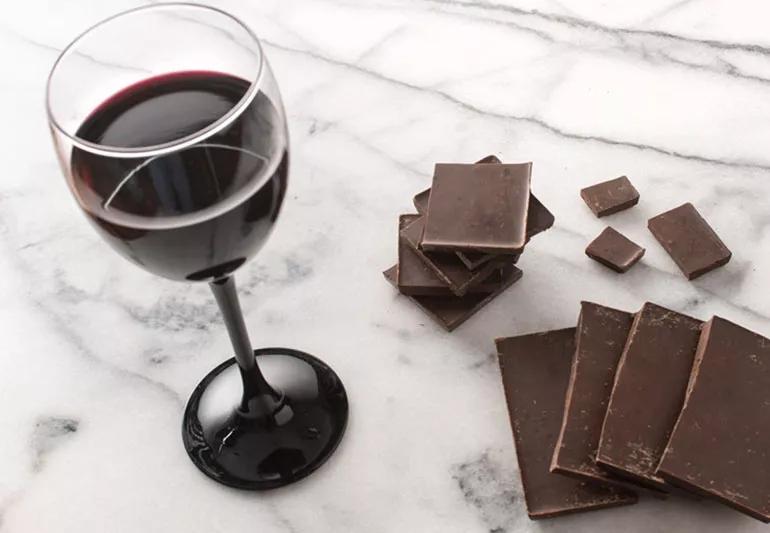Moderation is key for both indulgences

Image content: This image is available to view online.
View image online (https://assets.clevelandclinic.org/transform/f7c340d7-5672-4ebe-8455-b45b33e9600d/wineChocolate-ashley-051220-770x533-1_jpg)
Wine and dark chocolate
What’s the healthier treat: A glass of red wine with dinner or a square of dark chocolate after dinner?
Advertisement
Cleveland Clinic is a non-profit academic medical center. Advertising on our site helps support our mission. We do not endorse non-Cleveland Clinic products or services. Policy
The best food plan involves lots of vegetables, fruits, whole grains, nuts and olive oil. But there’s room for an occasional indulgence, too, says dietitian Julia Zumpano, RD, LD.
Here’s the lowdown on these two treats, which have both been reported to have heart-healthy benefits.
A study published in 1979 first showed a link between lower rates of heart disease in countries where people drank more wine, even though those countries often also had diets higher in saturated fat. This phenomenon later became known as The French Paradox, and it triggered much more research into the potential health benefits of wine.
At the forefront of this conversation is an all-star antioxidant called resveratrol. It’s found in grape skins (and wine), apples, peanuts, soy and other foods.
Non-human studies have found that resveratrol may protect against hypertension, hardening of the arteries, stroke, heart attack and heart failure. But studies in humans haven’t consistently shown these same effects.
“The effect, if it exists, is likely small,” Zumpano says.
But some long-term studies have linked light-to-moderate drinking in general with a lower risk of death from cardiovascular disease.
That light-to-moderate part is important, though. When it’s overdone, alcohol can become a risk factor for a number of chronic diseases and may trigger atrial fibrillation.
Advertisement
What does all of this mean? If you don’t drink, it’s not recommended that you start. But if you enjoy some alcohol as part of a healthy lifestyle, dietary guidelines and The American Heart Association recommend a maximum of one drink per day for women and two drinks per day for men.
Studies have linked moderate chocolate intake with a lower risk of heart disease, stroke and diabetes.
Why? It could be because cocoa beans are high in flavanols, a type of nutrient also found in some fruits, vegetables and tea. Research has linked flavanols to reduced blood pressure and improved heart health.
But processing may cut down some of the flavanol content, and the amount that ends up in your commercial chocolate bar varies by brand. Dark chocolate will have more than milk chocolate, but there’s no way to know for sure how much.
As with wine, there’s also a downside to chocolate. It’s high in calories, saturated fat and, sometimes, sugar. One ounce of dark chocolate can contain as many as 170 calories, and most average-sized chocolate bars are between 1.5 to 3.5 ounces, so it can be easy to go overboard.
Your best bet for heart health is to eat a diet rich in fruits, vegetables, lean proteins and healthy fats, and low in processed meat, dairy and sweets.
And if you enjoy them, moderate amounts of red wine and chocolate can be part of that. There are potential upsides and downsides to both.
“If you’re consuming small quantities of chocolate or the occasional glass of wine because you enjoy these foods, there’s no reason to change,” Zumpano reassures.
Advertisement

Sign up for our Health Essentials emails for expert guidance on nutrition, fitness, sleep, skin care and more.
Learn more about our editorial process.
Advertisement
This color additive, found in many pre-packaged foods, may affect people with ADHD or allergies
With a focus on internal cues for hunger and fullness, this eating style may revolutionize your relationship with food
Review the ingredients, watch for sugar and fat, and choose one with the right amount of protein for your needs
Getting the hang of portions can help you better understand how much to put on your plate
A typical recommended balanced diet is half fruits and veggies, a quarter protein and a quarter grains
Foods high in protein, fiber and water can help keep hunger at bay
This quirky food trend is harmless, as long as you’re getting enough protein, fiber and healthy fats
With a little planning, you can fill your belly and boost your energy
Prioritize your health by managing stress, strengthening your social connections and getting quality sleep
Bolsters, blankets, pillows and blocks can offer extra support, stability and comfort
Allergies, postnasal drip, asthma or reflux could be to blame for a cough that won’t quit